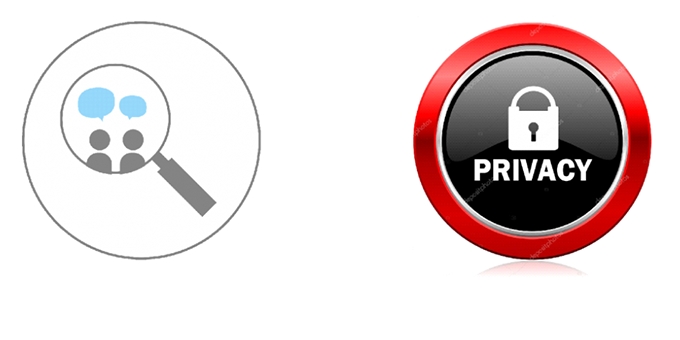In autonomous vehicles, should the information in the vehicles storage be transparent (to all vehicles nearby) or should it all be kept private unless the vehicles owner wants to share that information publicly?
 Transparency vs. Privacy
Transparency vs. Privacy

J. Gerry Purdy and Andy Marken
Transparency is open. Privacy is closed. You can’t have it both ways. This column discusses the various aspects of how we treat information and the difficulty we all face at times due to the pulling and tugging between being open and transparent versus being closed and private.
A couple of weeks ago, Andy Marken wrote an excellent guest column entitled, “Autonomous Driving and Storage,” (Sept. 5). During our follow up conversation, we discussed the issue of transparency and the counter point of privacy. For example, in autonomous vehicles, should the information in the vehicle’s storage be transparent (to all vehicles nearby) or should it all be kept private unless the vehicle’s owner wants to share that information publicly?
You begin to answer this question in a basic manner but quickly find that it becomes a very difficult question to answer and one that can’t be answered definitely for all situations. You can argue that all the information generated in an autonomous vehicle should be placed into the public domain so that the vehicles around it can best manage to avoid accidents.
Quickly, the counter is that the owner should only share the information that is directly necessary for defining where the car is and if there is any problem in which the vehicle needs to notify the others around them. And, of course, the owner of the vehicle may be playing music from their online account through the vehicle’s audio system and will not want to share that information with passengers in nearby vehicles (autonomous or not).
You can see that this is topic a very Interesting and a very deep and broad subject. But, it’s difficult to have both total transparency and total privacy at the same time. You can’t keep everything private and have transparency (even for important alerting information). And, you can’t share everything as that violates privacy. Simply put, you can’t have your cake and eat it too. Let’s dive into this a bit deeper.
It is difficult to post your life online and then expect it to be private. You have to be selective – you share some information that you feel is not going to result in any personal harm and keep other information private that others don’t need to know about. Or, in another way, there is some information that you share with some people but not others. But, in all situations, you don’t want someone to be able to accumulate all your personal information by scraping it from what you have shared with different people.
This, of course, is what Facebook enabled via data shared with some third parties. A number of major firms are just now in the process of figuring out how to prevent sharing all of a person’s information. Thus far, it is uncertain if such control is even possible.
Now, let’s jump to the area of intellectual property. Do we need to protect inventions and the associated legal version of it in intellectual property? Yes, companies should be paid when their technology/IP is used by others. And that requires some level(s) of protection and permission via licensing. You can see that this can easily become a big problem if someone’s IP is stolen and/or distributed to others without permission.
Many problems like this have become a big issue in China that started when copies were being made of just about everything from CDs, DVDs to software. China has more recently begun to crack down on these violations. Again, only those that honor the privacy of someone else’s IP will enable a system that works for all parties.
Next, let’s consider confidentiality agreements (NDAs). These are really sticky because it takes more than agreement to make the process work. If you say these specific plans and products are confidential and shouldn't be discussed or shared with others, then we each have a professional and ethical responsibility not to disclose them to others. Does the confidentiality agreement stop us? No, personal professionalism and ethics stops us. The paper that the agreement is written on is a means of assigning our good faith to what we said. But, will it actually stop us for improper disclosure? Possibly.
There's a huge chasm between accidentally and purposely violating the agreement.
We can honor the agreement "in good faith" and still accidentally disclose information such as when a sales person is talking with a prospect and attempting to make a sale or a consultant explaining how a solution might work for a company based on recent experience and results knowledge. The individual didn't mean to share private data but it can be part of a person's accumulated knowledge/experience/expertise.
Purposely it happens when the individual's direct/ethical behavior results in confidential information being sold to someone else.
If there is a doubt or there is a concern then information omission is the best privacy assurance at your disposal. People seemingly always want to know everything but all the other party really requires is enough information to meet your needs.
How about privacy and security for the CIA/FBI/NSA/police? Yes, bad people do bad things and have to be tracked down and punished. But, how far can privacy of the individual be invaded is a difficult question to answer. If you were going to blow up a building or otherwise kill someone, should the "protective agency" have the right to do whatever it takes to protect human life and property? Absolutely. However, then where is the line crossed and becomes a personal invasion that sweeps in the innocent or the do-nothing bystander? Law typically defines the standard by which we can provide interpretation of the behavior. Look at how difficult this becomes when an innocent teenager is gunned down by a law enforcement officer who may believe that the teen is running away from a crime?
When we signed up for Google and getting ad-supported content for free, did we give them the right to mine our data and use it? In a way, we did give them permissions it was legal consideration in return for obtaining something at no cost. Does Netflix and Apple have the right to examine my information, my activity - internally only - to deliver me better service, better products that we're paying for? Technically, the answer is “no”, but it happens all the time. Do we mind? No, because it increases our satisfaction and as long as they don't cross over that fine line, people are happy with what these companies are doing with their personal data until it becomes a gigantic problem like what Facebook is now trying to address.
Do we share our Netflix password with "friends" to help them out? No, because that is "stealing" from Netflix. Microsoft deals with this problem by offering to give the Office subscriber the permission to share the license with (just recently) six other people on all of their devices. We pay for Bloomberg, NY Times, National Geo because there is personal value to us. Could we obtain it, use it, benefit from it without paying? Probably, but that is a disservice to them which we personally can't go along with.
Many have said that we never should have started the process of getting information for free in exchange for giving up personal information. This clearly hurt the publishing business but video has retained the process of selling it (e.g. Amazon Prime or Netflix subscription) in order to get access to information. Very little personal information is captured. The financial gain comes from paying for information not from the provider selling our personal information to others.
Your free over-the-top (OTT) streaming services have a "right" to mine your data to help them "sell" ads to companies. Do they have a right to sell it to 3rd/4th parties to use for god knows what? No, because it is just a way for them to make added "profit" and there are no controls in place as to how or why your data is used. This is why you are seeing so many ‘skinny-bundles’ of streaming content from legitimate providers like CBS, NBC, etc.
Facebook's (and Google's) use of your data to sell advertisers is "OK" but to open up their databases of personal information to reap information for their own use is not OK (as we found out).
In hindsight, Google search engine isn’t a problem by itself. Rather, it’s the search results that offer “Sign up now. It’s Free!” that causes the problems.
Strategic Insights
You can see here that the topic of transparency and privacy are easy to define and deal with at a top level, but they get very complex as you dig down further into each topic. This is clearly a case that you can’t have both transparency and privacy at the same time. Saying this another way, you can have varying amounts of transparency and privacy regarding a particular subject, but you can’t have total transparency and privacy at the same time.
This reminds us of the phrase, “It’s just too good to be true” as in “We’ll give you all this amazing information for free. Just give us some personal information.” Paying for information is now being appreciated and accepted where it was often ignored in the past. Think hard the next time a website offers to give you something for free. You may be better off paying for it elsewhere.
The content & opinions in this article are the author’s and do not necessarily represent the views of RoboticsTomorrow
Featured Product

